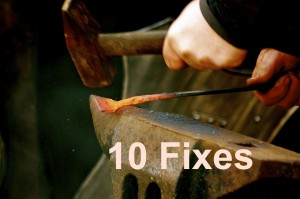“Telling me to ‘Be clear’ is like telling me to ‘Hit the ball squarely.’ I know that. What I don’t know is how to do it.” —Joseph M. Williams
First, lets look at an unclear, wordy passage.
Grayson said he’d made a decision not to return to their relationship due to the fact that Ella was unable to change.1 Hadn’t he seen her establishment of a different approach to her behavior over the last year? 2 She’d made great improvement in the area of dealing with life’s problems. 3
Under the circumstance in which Dr. Peters came to town, Ella’s hope was ignited by him. 4 It was her belief that Grayson wasn’t aware of the root of her poor attitude, but Dr. Peters was. 5 Through the patient inquiry method therapy, he showed her how her upbringing had an impact on the way she perceived and reacted to her environment. 6 He really helped her rise above her past injuries and learn new ways of how to respond to her fears. 7
Second, lets consider fixes for clearness and conciseness – sentence by sentence. (All 10 fixes are mentioned – a few, multiple times. Fixes are in parentheses.)
Sentence 1.
- Watch for the verb make: make a decision (decided); made use of (used); made a correction (corrected).
- Avoid wordy phrases: Due to the fact that. (because) Was unable to. (could)
Sentence 2.
- Avoid changing verbs into nouns, especially adding –tion — was in need of an estimation, instead of needed to estimate. In our example, we had establishment of a different approach (rewrite with strong verbs)
Sentence 3.
- Watch for the word make: made great improvement (improved).
- Avoid vague, encompassing noun phrases: in the area of dealing with (remove the unnecessary phrase the area of.)
Sentence 4.
- Avoid wordy phrases: Under the circumstance in which (when)
- Use active voice. Watch for the word by. Her hope was ignited by him (he ignited her hope)
Sentence 5.
- Limit it is, there is, and there are: It was her belief that (in the example, the phrase was unnecessary)
- Avoid wordy phrases: Wasn’t aware of (didn’t understand; or didn’t realize)
Sentence 6.
- Avoid strings of nouns: patient inquiry method therapy (through asking probing questions)
- Avoid inflated words: an impact on (affect) (more examples: facilitate (help); cognizant of (know))
Sentence 7.
- Delete weasel words: really helped (helped) (more examples: very unique; quite nice)
- Avoid unnecessary prepositional phrases: of how to respond to her fears (to face her fears) (See post about reducing of.)
Finally, lets look at a possible rewrite.
Grayson refused to reconcile their relationship, because he believed Ella could never change. What did he think she’d been tackling this past year? She’d turned her life around.
When Dr. Peters came to town, he ignited Ella’s hope. Grayson misunderstood the root of her poor attitude, but Dr. Peters recognized the source. Through asking probing questions, he revealed how her upbringing had affected the way she perceived and reacted to her environment. Over time, he helped her forgive old injuries and learn new ways to face her fears.
10 Ways to improve wordy & unclear sentences. Click to tweet.
Which tip will improve your sentences?





 RSS - Posts
RSS - Posts



This frustrates me in my own writing, and I see it so much in other writer’s pieces. Great tips on how to fix it!! Thanks so much!
Jan, I’m trying harder to catch the wordiness in my writing so my critique partner doesn’t have to.
Well done, Zoe! Excellent examples. Varying sentence lengths as you did on the corrected version is also a great rule . And no “very” ever lol. Yes, I am an English teacher by profession. 😀. But needed the reminders again, thanks.
I was so concentrated on the fixes, Tanya, I forgot about purposely varying sentence length. I’m glad you brought that up, because I agree that’s important.
I wish I could eliminate all the extra words in my thought processes like that!
Hi Jane, I often don’t see the wordiness until I go back and edit the scene I wrote the day before. Sometimes I miss wordiness and unclear sentences, but my critiques partner spots them.
The most helpful tip for me: watch out for “make”. That resonated with me because it’s such an easy mistake to fix as long as you catch it. Thanks for that, Zoe. Cheers
You’re right, Marilyn. I think I’ll search right now on “made” in my wip.